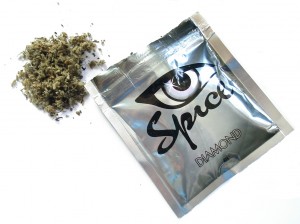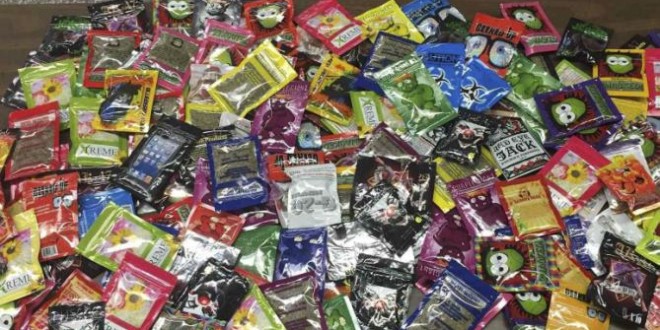Federal authorities say they’ve busted a major drug ring that distributed synthetic marijuana in Los Angeles.
 The U.S. attorney’s office for the region announced in October that federal agents had arrested a dozen suspects as part of a larger crackdown on synthetic weed, commonly known as Spice. All were California residents, and their alleged drug conspiracy targeted homeless people living in the city’s Skid Row, near downtown.
The U.S. attorney’s office for the region announced in October that federal agents had arrested a dozen suspects as part of a larger crackdown on synthetic weed, commonly known as Spice. All were California residents, and their alleged drug conspiracy targeted homeless people living in the city’s Skid Row, near downtown.
Spice is a drug made in laboratories by synthesizing the cannabinoids found in marijuana. The idea is to produce a high similar to that of pot, but without positive drug test results. Synthetic marijuana also allows its makers to evade criminal responsibility in some cases, since their products often contain substances that have not yet been banned by the Controlled Substances Act.
Potentially lethal effects
The high, unfortunately, comes with serious adverse effects, including rapid heartbeat, grand mal seizures, and psychosis. People high on the substance have allegedly gone ballistic, becoming highly aggressive and mentally unbalanced. That’s to say nothing of the fatalities, which remain few in number but are growing.
“These are extremely dangerous drugs, despite being falsely marketed to youth as being a ‘safe’ alternative and having innocent names like ‘Spice’ and ‘K2,'” said the U.S. attorney for Los Angeles, Eileen M. Decker. “The often unknown and constantly changing chemicals in these drugs can have unpredictable and devastating effects on users.”
The suspects include six residents of Los Angeles, an Ontario, Cal., resident, and five Orange County residents. They face felony charges of conspiracy to manufacture drugs, possession with intent to distribute, and distribution of a controlled-substance analogue.
Nationwide anti-Spice effort
 The busts were part of a larger anti-Spice campaign, a push that has resulted in 151 arrests nationwide. The federal government has devoted increasing resources to fighting synthetic marijuana, which has resulted in at least a handful of deaths in the Northeastern United States.
The busts were part of a larger anti-Spice campaign, a push that has resulted in 151 arrests nationwide. The federal government has devoted increasing resources to fighting synthetic marijuana, which has resulted in at least a handful of deaths in the Northeastern United States.
As L.A. Weekly noted, though, it’s hard to understand why synthetic cannabis would find much of a foothold in California. Real marijuana is cheap, semi-legal, and easy to get for almost any adult, and the experience is decidedly more pleasant.
The explanation probably involves a mix of factors, including practical costs, availability, and drug testing. Young people are among the most frequent users of Spice, and they are the people who have the hardest time getting their hands on real weed. They’re also more likely to face mandatory drug testing.
Spice is likewise popular among people of low incomes. However cheap pot may be, synthetic pot is cheaper. That’s in part because people who want to smoke the real thing must first get a doctor’s recommendation, and that can be too costly for someone who has no more than a few dollars to spend at a time.
It may be telling that Spice has exploded in popularity since it was banned by the DEA in 2011. It’s nearly impossible to legislate human drug use, and the way this prohibition has backfired suggests the future lies with full legalization of all drugs.
 California Marijuana Market Breaking "Marijuana News" from CA
California Marijuana Market Breaking "Marijuana News" from CA


